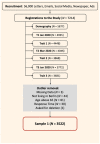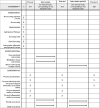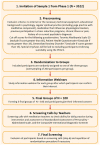Investigating differential effects of socio-emotional and mindfulness-based online interventions on mental health, resilience and social capacities during the COVID-19 pandemic: The study protocol
- PMID: 34735441
- PMCID: PMC8568275
- DOI: 10.1371/journal.pone.0256323
Investigating differential effects of socio-emotional and mindfulness-based online interventions on mental health, resilience and social capacities during the COVID-19 pandemic: The study protocol
Abstract
Background: The SARS-CoV-2 pandemic has led to a mental health crisis on a global scale. Epidemiological studies have reported a drastic increase in mental health problems, such as depression and anxiety, increased loneliness and feelings of disconnectedness from others, while resilience levels have been negatively affected, indicating an urgent need for intervention. The current study is embedded within the larger CovSocial project which sought to evaluate longitudinal changes in vulnerability, resilience and social cohesion during the pandemic. The current second phase will investigate the efficacy of brief online mental training interventions in reducing mental health problems, and enhancing psychological resilience and social capacities. It further provides a unique opportunity for the prediction of intervention effects by individual biopsychosocial characteristics and preceding longitudinal change patterns during the pandemic in 2020/21.
Methods: We will examine the differential effects of a socio-emotional (including 'Affect Dyad') and a mindfulness-based (including 'Breathing Meditation') intervention, delivered through a web- and cellphone application. Participants will undergo 10 weeks of intervention, and will be compared to a retest control group. The effectiveness of the interventions will be evaluated in a community sample (N = 300), which is recruited from the original longitudinal CovSocial sample. The pre- to post-intervention changes, potential underlying mechanisms, and prediction thereof, will be assessed on a wide range of outcomes: levels of stress, loneliness, depression and anxiety, resilience, prosocial behavior, empathy, compassion, and the impact on neuroendocrine, immunological and epigenetic markers. The multi-method nature of the study will incorporate self-report questionnaires, behavioral tasks, ecological momentary assessment (EMA) approaches, and biological, hormonal and epigenetic markers assessed in saliva.
Discussion: Results will reveal the differential effectiveness of two brief online interventions in improving mental health outcomes, as well as enhancing social capacities and resilience. The present study will serve as a first step for future application of scalable, low-cost interventions at a broader level to reduce stress and loneliness, improve mental health and build resilience and social capacities in the face of global stressors.
Trial registration: This trial has been registered on May 17, 2020 with the ClinicalTrials.gov NCT04889508 registration number (clinicaltrials.gov/ct2/show/NCT04889508).
Conflict of interest statement
The authors have declared that no competing interests exist.
Figures






References
-
- Hossain MM, Tasnim S, Sultana A, Faizah F, Mazumder H, Zou L, et al. Epidemiology of mental health problems in COVID-19: A review [Internet]. Vol. 9, F1000Research. F1000 Research Ltd; 2020. [cited 2021 Jun 1]. Available from: /pmc/articles/PMC7549174/ doi: 10.12688/f1000research.24457.1 - DOI - PMC - PubMed
-
- Tsamakis K, Tsiptsios D, Ouranidis A, Mueller C, Schizas D, Terniotis C, et al. COVID-19 and its consequences on mental health (Review). Experimental and Therapeutic Medicine [Internet]. 2021. Jan 22 [cited 2021 Jun 1];21(3):1–1. Available from: http://www.spandidos-publications.com/10.3892/etm.2021.9675/abstract - DOI - PMC - PubMed
-
- Li S, Wang Y, Xue J, Zhao N, Zhu T. The impact of covid-19 epidemic declaration on psychological consequences: A study on active weibo users. International Journal of Environmental Research and Public Health [Internet]. 2020. Mar 2 [cited 2021 Jun 1];17(6):2032. Available from: www.mdpi.com/journal/ijerph - PMC - PubMed
Publication types
MeSH terms
Associated data
LinkOut - more resources
Full Text Sources
Medical
Research Materials
Miscellaneous

